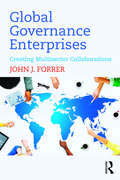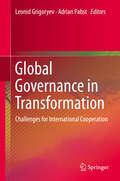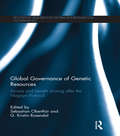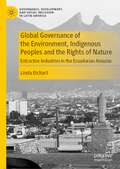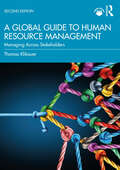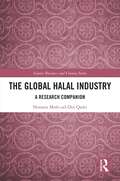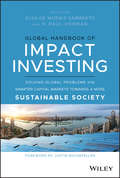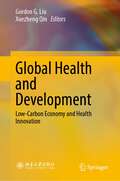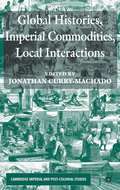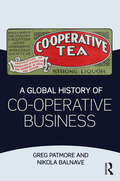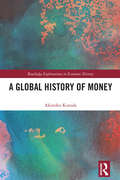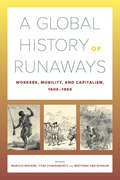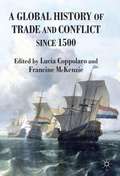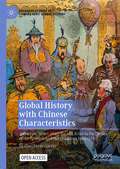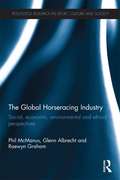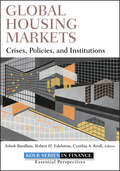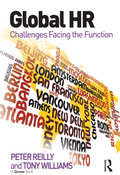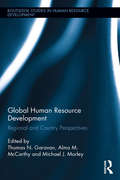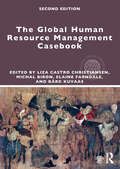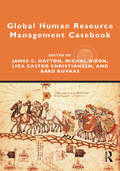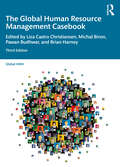- Table View
- List View
Global Governance Enterprises: Creating Multisector Collaborations
by John J. ForrerGlobal Governance Enterprises focuses on a specific multi-sector collaboration—the formation of an entity that carries out global governance—providing a detailed analysis of the context of their emergence, as well as how they are created, managed, and sustained. Forrer considers the growing challenges to successful global governance and the role of multi-sector collaborations in overcoming these challenges, arguing that such partnerships should be considered successful only when they meet specific conditions that ensure they are “doing well” and “doing good.” By establishing a coherent framework to define global governance enterprises across a wide span of sectors, the book develops a strong theoretical foundation for this type of partnership and provides the reader with an understanding of the practical, operational realities of organizing, financing, and sustaining global governance enterprises. It includes a full section of case studies, ranging from healthcare to environmental organizations, providing practical insight into this form of governance and its function. This book should be on the shelf of any professional or student interested in global governance, public–private partnerships, or public management.
Global Governance in Transformation: Challenges for International Cooperation
by Leonid Grigoryev Adrian PabstThis book analyzes the state of global governance in the current geopolitical environment. It evaluates the main challenges and discusses potential opportunities for compromise in international cooperation. The book’s analysis is based on the universal criteria of global political stability and the UN framework of sustainable development. By examining various global problems, including global economic inequality, legal and political aspects of access to resources, international trade, and climate change, as well as the attendant global economic and political confrontations between key global actors, the book identifies a growing crisis and the pressing need to transform the current system of global governance. In turn, it discusses various instruments, measures and international regulation mechanisms that can foster international cooperation in order to overcome global problems. Addressing a broad range of topics, e.g. the international environmental regime, global financial problems, issues in connection with the energy transition, and the role of BRICS countries in global governance, the book will appeal to scholars in international relations, economics and law, as well as policy-makers in government offices and international organizations.
Global Governance of Genetic Resources: Access and Benefit Sharing after the Nagoya Protocol (Routledge Research in Global Environmental Governance)
by Sebastian Oberthür G. Kristin RosendalThis book analyses the status and prospects of the global governance of Access Benefit Sharing (ABS) in the aftermath of 2010’s Nagoya Protocol to the Convention on Biological Diversity (CBD). The CBD’s initial 1992 framework of global ABS governance established the objective of sharing the benefits arising from the use of genetic resources fairly between countries and communities. Since then, ABS has been a contested issue in international politics – not least due to the failure of effective implementation of the original CBD framework. The Nagoya Protocol therefore aims to improve and enhance this framework. Compared to the slow rate of progress on climate change, it has been considered a major achievement of global environmental governance, but it has also been coined a ‘masterpiece of ambiguity’. This book analyses the role of a variety of actors in the emergence of the Nagoya Protocol and provides an up-to-date assessment of the core features of the architecture of global ABS governance. This book offers a central resource regarding ABS governance for those working on and interested in global environmental governance. This is achieved by focusing on two broad themes of the wider research agenda on global environmental governance, namely architecture and agency. Furthermore, individual chapter contributions relate and link ABS governance to other prominent debates in the field, such as institutional complexes, compliance, market-based approaches, EU leadership, the role of small states, the role of non-state actors and more. Partly due to its seeming technical complexity, ABS governance has so far not been at the centre of attention of scholars and practitioners of global environmental governance. In this book, care is taken to provide an accessible account of key functional features of the governance system which enables non-specialists to gain a grasp on the main issues involved, allowing the issue of ABS governance to move centre-stage and be more fully recognised in discussions on global environmental governance.
Global Governance of the Environment, Indigenous Peoples and the Rights of Nature: Extractive Industries in the Ecuadorian Amazon (Governance, Development, and Social Inclusion in Latin America)
by Linda EtchartThis book explores the obstacles facing indigenous communities, non-governmental organizations, governments, and international institutions in their attempts to protect the cultures of indigenous peoples and the world’s remaining rainforests.Indigenous peoples are essential as guardians of the world’s wild places for the maintenance of ecosystems and the prevention of climate change. The Amazonian/Andean indigenous philosophies of sumac kawsay/suma qamaña (buen vivir) were the inspiration for the incorporation of the Rights of Nature into the Ecuadorian and Bolivian constitutions of 2008 and 2009. Yet despite the creation of the United Nations Permanent Forum on Indigenous Issues (2000), and the adoption of the United Nations Declaration on the Rights of Indigenous Peoples (2007), indigenous peoples have been marginalized from intergovernmental environmental negotiations. Indigenous environment protectors’ lives are in danger while the Amazon rainforests continue to burn.By the third decade of the 21st century, the dawn of “woke” capitalism was accompanied by the expansion of ethical investment, with BlackRock leading the field in the “greening” of investment management, while Big Oil sought a career change in sustainable energy production. The final chapters explain the confluence of forces that has resulted in the continued expansion of the extractive frontier into indigenous territory in the Amazon, including areas occupied by peoples living in voluntary isolation.Among these forces are legal and extracurricular payments made to individuals, within indigenous communities and in state entities, and the use of tax havens to deposit unofficial payments made to secure public contracts. Solutions to loss of biodiversity and climate change may be found as much in the transformation of global financial and tax systems in terms of transparency and accountability, as in efforts by states, intergovernmental institutions and private foundations to protect wild areas through the designation of national parks, through climate finance, and other “sustainable” investment strategies.
Global Growth and Financial Spillovers and the South African Macro-economy
by Mthuli Ncube Eliphas Ndou Nombulelo GumataTo what extent is South Africa affected by G8 economies and BRIC growth shocks? This book identifies channels that amplify these shock effects, the relevance of third country transmission effects and the effects of the first and second rounds of US quantitative easing. The changing reactions of South African variables over time to financial shocks emanating from the US and selected countries in the Euro area, is presented. The book quantifies the effects of capital flow shocks, determines the counterfactuals of asset prices and economic growth variables, and compares the contribution of capital flows and domestic macro factors on asset prices. The effects of the exchange rate depreciation are contrasted to the decline in investment as key drivers of the trade balance. Stock market interdependence is determined amongst South African, Indian and Brazilian equities. The contributions of stock price returns and volatility on South African economic growth are contrasted. The authors construct a financial stress index for South Africa and determine how it amplifies shocks.
A Global Guide to FinTech and Future Payment Trends (Innovation and Technology Horizons)
by Peter GoldfinchBeing able to make and receive payments is an essential facet of modern life. It is integral to the banking and finance systems, and it touches all global citizens. In some areas, payment systems are rapidly evolving – moving swiftly from paper payment instruments, to electronic, to real-time – but in others, underdeveloped payment systems hold back economic and social development. This book is intended to assist the reader in navigating the payments landscape. The author explores highly topical areas, such as the role of payment systems in enabling commerce to contribute to the development of emerging economies, the evolution of payment systems from paper instruments to computerization, the role of cryptocurrencies, and the slow decline of plastic credit and debit cards owing to alternative forms of payment being introduced. Altogether, this book provides a comprehensive overview of the evolution of payment and offers projections for the future, encouraging readers to explore their own predictions, using the framework that the book has provided. It is vital reading for technologists, marketers, executives and investors in the FinTech sector, as well as academics teaching business and technology courses.
A Global Guide to Human Resource Management: Managing Across Stakeholders
by Thomas KlikauerA Global Guide to Human Resource Management is a concise HRM introductory text offering a uniquely non-region-specific approach to people management in international business organisations. The book presents an alternative to standard managerial approaches, reflecting the perspectives of multiple stakeholders (workers, trade unions, states and governments, NGOs) to critically evaluate HRM in practice and, in so doing, enables students to make effective decisions in their own practice, wherever their careers take them. Its accessibility and concision make it well suited to short courses for non-HRM and non-business specialists. This text covers all major introductory topics for non-specialists, introducing the concept and purpose of HRM, through recruitment, people, skills, designing work, promoting health, rewarding success, and successful and ethical people management. This edition includes a new chapter on green HRM. Rich with pedagogical features, the book includes five case studies per chapter to connect theory with practice. It is also supported with a range of instructor materials including online guest lectures, general discussion questions, a glossary, an index, and online documentaries that explain how to manage people. It is essential reading for students interested in Human Resources and Personnel Management, Organisational Behaviour and Development and Workplace Culture.
Global Guyana: Shaping Race, Gender, and Environment in the Caribbean and Beyond
by Oneka LaBennettExposes the global threat of environmental catastrophe and the forms of erasure that structure Caribbean women’s lives in the overlooked nation of GuyanaPreviously ranked among the hemisphere’s poorest countries, Guyana is becoming a global leader in per capita oil production, a shift which promises to profoundly transform the nation. This sea change presents a unique opportunity to dissect both the environmental impacts of modern-world resource extraction and the obscured yet damaging ways in which intersectional race and gender formations circumscribe Caribbean women’s lives.Drawing from archival research and oral history, and examining mass-mediated flashpoints across the African and Indian diasporas—including Rihanna’s sonic routes, ethnic conflict reportage, HBO’s Lovecraft Country, and Netflix’s Indian Matchmaking—Global Guyana repositions this marginalized nation as a nexus of social and economic activity which drives popular culture and ideas about sexuality while reshaping the geopolitical and literal topography of the Caribbean region. Oneka LaBennett employs the powerful analytic of the pointer broom to disentangle the symbiotic relationship between Guyanese women’s gendered labor and global racial capitalism. She illuminates how both oil extraction and sand export are implicated in a well-established practice of pillaging the Caribbean’s natural resources while masking the ecological consequences that disproportionately affect women and children.Global Guyana uncovers how ecological erosion and gendered violence are entrenched in extractive industries emanating from this often-effaced but pivotal country. Sounding the alarm on the portentous repercussions that ambitious development spells out for the nation’s people and its geographical terrain, LaBennett issues a warning for all of us about the looming threat of global environmental calamity.
The Global Halal Industry: A Research Companion (Islamic Business and Finance Series)
by Hussain Mohi-ud-Din QadriThe word ‘Halal’ translates to ‘permissible’ in English, though it encapsulates a broader meaning that goes beyond permissibility and impermissibility. Halal incorporates hygiene, cleanliness, legality, compliance, ethics as well as cultural aspects. This book provides a holistic overview of the relevant concepts but also covers Shariah, commercial, regulatory and technological aspects of the global Halal industry. It is not confined to a specific region, country or sector, rather it gives a comprehensive summary of the developments and growth across all sectors of the Halal industry, at the regional but also the global level.It is a well-researched and accessible volume which sets out to demystify some of the more challenging areas and offers an in-depth synopsis of each of the research questions it answers. The book also contributes a series of chapters with specialized treatment. It explores the key Shariah issues and guiding principles of Islamic law, technical know-how within various sectors such as Halal food, tourism, cosmetics, pharma, logistics, supply chain, media & fashion and offers a discussion on Artificial intelligence, quantum technology, and blockchain in different sectors of the Halal industry. Moreover, this work proposes viable solutions to the challenges faced by the industry such as the harmonization of Halal standards.Beneficial to audiences of all levels from beginners to advanced, it will be a handy reference for researchers and advanced students studying Islamic business and economics, Halal management, nutritional sciences, tourism, media, fashion and pharmaceuticals. It will also be of benefit to practitioners, policymakers and legal and standard-setting bodies.
Global Handbook of Impact Investing: Solving Global Problems Via Smarter Capital Markets Towards A More Sustainable Society
by Elsa De Morais Sarmento Paul R. HermanDiscover how to invest your capital to achieve a powerful, lasting impact on the world.The Global Handbook of Impact Investing: Solving Global Problems Via Smarter Capital Markets Towards A More Sustainable Society is an insightful guide to the growing world-wide movement of Impact Investing. Impact investors seek to realize lasting, beneficial improvements in society by allocating capital to sources of impactful and sustainable profit. This Handbook is a how-to guide for institutional investors, including family offices, foundations, endowments, governments, and international organizations, as well as academics, students, and everyday investors globally. The Handbook´s wide-ranging contributions from around the world make a powerful case for positive impact and profit to fund substantive, lasting solutions that solve critical problems across the world. Edited by two experienced and distinguished professionals in the sustainable investing arena and authored by two dozen renowned experts from finance, academia, and multilateral organizations from around the world, the Global Handbook of Impact Investing educates, inspires, and spurs action towards more responsible investing across all asset classes, resulting in smarter capital markets, including how to: · Realize positive impact and profit · Integrate impact into investment decision-making and portfolio · Allocate impactful investments across all asset classes · Apply unique Impact Investing frameworks · Measure, evaluate and report on impact · Learn from case examples around the globe · Pursue Best Practices in Impact Investing and impact reporting While other resources may take a local or limited approach to the subject, this Handbook gathers global knowledge and results from public and private institutions spanning five continents. The authors also make a powerful case for the ability of Impact Investing to lead to substantive and lasting change that addresses critical problems across the world.
Global Health and Development: Low-Carbon Economy and Health Innovation
by Gordon G. Liu Xuezheng QinThis book reviews the global preparedness to pandemic challenges to human health and development by compiling the brilliant ideas of experts and entrepreneurs from the fields of public health, health economics, environmental engineering, pharmaceutical interventions, and other related fields.This book proposes a collective effort to take pandemic prevention, preparedness, and response seriously and prioritize it accordingly to avoid the potential catastrophe in this inter-connected world by summarizing the lessons learned from the COVID-19. In the context of today’s climate change and its association with human health, the book presents the need for aligning climate and health goals and puts up with the multi-sectors and low-carbon economic strategies where health is prioritized in development.Furthermore, when more and more novel medical and pharmaceutical items worldwide are launched, the health system could be improved. With the help of digital health, artificial intelligence (AI), and other innovative forms of healthcare products, the efficiency and effectiveness of healthcare services provision could be promoted, leading to a more promising future for human health.This book vividly presents how such new technologies are applied to build an intelligent and robust health system and how innovations can be used to promote human health.
Global Healthcare Exchange
by Jamie Ladge Lynda M. ApplegateFounded in March 2000 at the height of the dot-com bubble, Global Healthcare Exchange (GHX) was one of 90 online marketplaces in the health care industry. The company's founders were among the largest suppliers in the industry, including Johnson & Johnson, GE Medical, Abbot, Baxter, and Medtronic. Becton-Dickinson, Braun, Guidant, Tyco, Siemens, C.R. Bard, and other key suppliers joined shortly after the company was founded. At the time of the case (spring 2003), GHX was the largest of the three remaining online health care marketplaces and ownership had expanded to include the leading players across all parts of the value chain, including health care providers and managed care organizations. Group purchasing organizations, distributors, and company executives must address key strategic issues, including integrating its latest merger, achieving profitability, defining a fair pricing strategy, and determining the pace of global expansion.
Global Histories, Imperial Commodities, Local Interactions
by Jonathan Curry-MachadoThe papers presented in this collection offer a wide range of cases, from Asia, Africa and the Americas, and broadly cover the last two centuries, in which commodities have led to the consolidation of a globalised economy and society - forging this out of distinctive local experiences of cultivation and production, and regional circuits of trade.
A Global History of Co-operative Business
by Greg Patmore Nikola BalnaveCo-operatives provide a different approach to organizing business through their ideals of member ownership and democratic practice. Every co-operative member has an equal vote regardless of his or her own personal capital investment. The contemporary significance of co-operatives was highlighted by the United Nations declaration of 2012 as the International Year of Co-operatives. This book provides an international perspective on the development of co-operatives since the mid-nineteenth century, exploring the economic, political, and social factors that explain their varying fortunes and transformation into different forms. By looking at what co-operatives are; how they have changed; the developments as well as the persecutions of the co-operative movement; and how it is an important force in promoting development and self-sufficiency in non-industrialized areas, this book provides valuable insight not only to academics, but also to practitioners and policy makers.
A Global History of Money (Routledge Explorations in Economic History)
by Akinobu KurodaLooking from the 11th century to the 20th century, Kuroda explores how money was used and how currencies evolved in transactions within local communities and in broader trade networks. The discussion covers Asia, Europe and Africa and highlights an impressive global interconnectedness in the pre-modern era as well as the modern age. Drawing on a remarkable range of primary and secondary sources, Kuroda reveals that cash transactions were not confined to dealings between people occupying different roles in the division of labour (for example shopkeepers and farmers), rather that peasants were in fact great users of cash, even in transactions between themselves. The book presents a new categorization framework for aligning exchange transactions with money usage choices. This fascinating monograph will be of great interest to advanced students and researchers of economic history, financial history, global history and monetary studies.
A Global History of Runaways: Workers, Mobility, and Capitalism, 1600–1850 (California World History Library #28)
by Marcus Rediker Titas Chakraborty Matthias Van RossumDuring global capitalism's long ascent from 1600–1850, workers of all kinds—slaves, indentured servants, convicts, domestic workers, soldiers, and sailors—repeatedly ran away from their masters and bosses, with profound effects. A Global History of Runaways, edited by Marcus Rediker, Titas Chakraborty, and Matthias van Rossum, compares and connects runaways in the British, Danish, Dutch, French, Mughal, Portuguese, and American empires. Together these essays show how capitalism required vast numbers of mobile workers who would build the foundations of a new economic order. At the same time, these laborers challenged that order—from the undermining of Danish colonization in the seventeenth century to the igniting of civil war in the United States in the nineteenth.
A Global History Of Trade And Conflict Since 1500
by Lucia Coppolaro Francine MckenzieThis book explains the causes and consequences of the intersection of two transformative global forces - trade and conflict - since 1500. The nine historical case studies - interspersed over 500 years and spanning the globe - make a major historical contribution to the enduring debate about whether trade makes peace more likely.
Global History with Chinese Characteristics: Autocratic States along the Silk Road in the Decline of the Spanish and Qing Empires 1680-1796 (Palgrave Studies in Comparative Global History)
by Manuel Perez-GarciaThis open access book considers a pivotal era in Chinese history from a global perspective. This book’s insight into Chinese and international history offers timely and challenging perspectives on initiatives like “Chinese characteristics”, “The New Silk Road” and “One Belt, One Road” in broad historical context. Global History with Chinese Characteristics analyses the feeble state capacity of Qing China questioning the so-called “High Qing” (shèng qīng 盛清) era’s economic prosperity as the political system was set into a “power paradox” or “supremacy dilemma”. This is a new thesis introduced by the author demonstrating that interventionist states entail weak governance. Macao and Marseille as a new case study aims to compare Mediterranean and South China markets to provide new insights into both modern eras’ rising trade networks, non-official institutions and interventionist impulses of autocratic states such as China’s Qing and Spain’s Bourbon empires.
The Global Horseracing Industry: Social, Economic, Environmental and Ethical Perspectives (Routledge Research in Sport, Culture and Society)
by Phil McManus Glenn Albrecht Raewyn GrahamHorseracing, thoroughbred breeding and gambling on racing are global industries worth several hundred billion dollars. They are also industries facing serious challenges, from the rise of alternative forms of leisure gambling to concerns about the ethical treatment of animals in all equestrian sports. This book offers a broad-ranging examination of the contemporary horseracing industry, from geographical, economic, social, ethical and environmental perspectives. The book draws on in-depth, mixed-method research into the racing and breeding industries in the US, Australia, the UK, Canada and New Zealand, and includes comparative material on other key racing centres, such as Ireland, Singapore and Hong Kong. It explores the economic structure of the global racing business, including comparisons with other major international sport businesses and other equestrian sports. It examines the social and cultural roots of the sport through its association with, and impact on, rural places, communities and environments from Kentucky to Newmarket – highlighting racing’s particular blend of tradition and scientific and technological innovation. The book also explores the ethical issues at the heart of horseracing, from reproduction to the use of the whip, and the inescapable tension between the horse as an instrumentally valuable commodity and the horse as an intrinsically valuable animal with needs and interests. The Global Horseracing Industry concludes by considering alternative futures for this major international sports business. The book is illuminating reading for anybody with an interest in sport, business, cultural geography, animal studies, or environmental studies.
Global Housing Markets
by Ashok Bardhan Robert H. Edelstein Cynthia A. KrollA global look at the reasons behind the recent economic collapse, and the responses to it The speculative bubble in the housing market began to burst in the United States in 2007, and has been followed by ruptures in virtually every asset market in almost every country in the world. Each country proposed a range of policy initiatives to deal with its crisis. Policies that focused upon stabilizing the housing market formed the cornerstone of many of these proposals. This internationally focused book evaluates the genesis of the housing market bubble, the global viral contagion of the crisis, and the policy initiatives undertaken in some of the major economies of the world to counteract its disastrous affects. Unlike other books on the global crisis, this guide deals with the housing sector in addition to the financial sector of individual economies. Countries in many parts of the world were players in either the financial bubble or the housing bubble, or both, but the degree of impact, outcome, and responses varied widely. This is an appropriate time to pull together the lessons from these various experiences. Reveals the housing crisis in the United States as the core of the meltdown Describes the evolution of housing markets and policies in the run-up to the crisis, their impacts, and the responses in European and Asian countries Compares experiences and linkages across countries and points to policy implications and research lessons drawn from these experiences Filled with the insights of well-known contributors with strong contacts in practice and academia, this timely guide discusses the history and evolution of the recent crisis as local to each contributor's part of the world, and examines its distinctive and common features with that of the U. S. , the trajectory of its evolution, and the similarities and differences in policy response.
Global HR: Challenges Facing the Function
by Peter Reilly Tony WilliamsThe HR function is having to adjust itself to the implications of the globalisation of business activity. This has meant adjusting its philosophy, policies and practices to fit new organisational imperatives, as well as creating its own refashioned service delivery model. Peter Reilly and Tony Williams's Global HR explores the key issues of building an international brand, culture and talent pool, whilst contributing to business and functional transformation, drawing on examples from multinationals in telecoms, fast-moving consumer goods, manufacturing, software, services and commodities. In doing so, they offer insights into managing people and businesses that no organization can ignore.
Global Human Resource Development: Regional and Country Perspectives (Routledge Studies in Human Resource Development)
by Thomas N. Garavan Alma M. McCarthy Michael J. MorleyDrawing on contributions from leading academics in the field, this volume within the Routledge Series in Human Resource Development specifically focuses on Global Human Resource Development (HRD). Specifically, the volume provides an overview of 17 regions, 85 countries and includes one emerging market grouping, CIVETS. This book examines the role of the state in HRD, the relationship between HRD and the level of economic development in the country or region, the influence of foreign direct investment within the country or region, and firm-level HRD practices within countries or regions. Global Human Resource Development analyzes HRD from institutional and cross-cultural perspectives, making it possible, for the first time, to analyze trends across countries and regions and to draw conclusions about the value of institutional and cross-cultural perspectives in the HRD context. There is currently no book on the market that conceptualizes the discipline of global HRD in this way, making this a definitive book on HRD across the globe of particular interest to researchers and reflective practitioners.
The Global Human Resource Management Casebook (Global HRM)
by Liza Castro Christiansen Michal Biron Elaine Farndale Bård KuvaasThis casebook is a collection of international teaching cases focusing on contemporary human resource management issues. Each case centers primarily on one country and illustrates a significant challenge faced by managers and HR practitioners, helping students to understand how the issues they learn about in class play out in the real world. The cases emphasize the national and cultural contexts of HR management, providing readers with a global understanding of employee motivation, reward systems, recruitment and selection, career development, and more. In this edition, the editors and authors have made significant updates to reflect recent developments in the field and cover a broader range of countries in Eastern Europe and Africa. The authors also delve into new industries like food service, clothing manufacturing, and transportation as well as IT and academia. Recommendations for further reading and relevant videos provide readers with practical insights into the modern HRM field. With more than 30 cases followed by questions and tasks to encourage reflection, this is a valuable companion for any student of human resource management.
Global Human Resource Management Casebook
by James HaytonThe Global Human Resource Management Casebook is a collection of business teaching cases, focusing on Human Resource Management issues around the world. Each case is based in a single country and illustrates one or more significant challenge faced by managers and HR practitioners. The influence of the unique national cultural and institutional context upon the issues in the case is emphasized. In total 32 unique and original cases are presented, each from different national contexts. Every case is followed by a set of questions for use in class discussion or private study of the cases. This casebook is a project undertaken by a committee of international members of the Human Resources Division of the Academy of Management (USA). The HR Division currently has over 3500 members worldwide, indicating a significant immediate audience for the text. The committee, referred to as the HR Ambassadors Committee (James Hayton, Chair) is intended to represent the global membership of the organization. We currently have members in over 60 countries, and Ambassadors for over 50 of these. The committee was established to contribute to the internationalization of the HR Division and the Academy of Management by creating collaborative projects that both involve and serve the global membership. This book, which represents the first product of our collaboration, is expected to provide a useful teaching tool for HRM educators, and secondarily is expected to be of use to HR practitioners with an interest in the globalization of HRM.
The Global Human Resource Management Casebook (Global HRM)
by Liza Castro Christiansen, Michal Biron, Pawan Budhwar, and Brian HarneyThe third edition of The Global Human Resource Management Casebook provides a wide range of international teaching cases exploring contemporary human resource management (HRM) challenges. Each case focuses primarily on one country and illustrates a critical HRM issue confronting managers and HRM practitioners. This real-world application provides students of HRM with a unique opportunity to examine how key HRM theories and ideas translate into practice. The case studies emphasize the national and cultural contexts of HRM, providing readers with a global understanding of HRM practices like recruitment, reward systems, diversity, and inclusion, as well as recent developments including the impact of the COVID-19 pandemic, remote working, sustainability, and digital transformation. In this edition, the editors and authors have made significant updates to reflect recent developments in the field and cover a broader range of countries. The authors also delve into new industries including consulting, energy, healthcare, IT, and education. With 31 international cases followed by further reading and learning resources, this extensive collection is an invaluable resource for any student seeking to explore contemporary HRM on a global basis.
